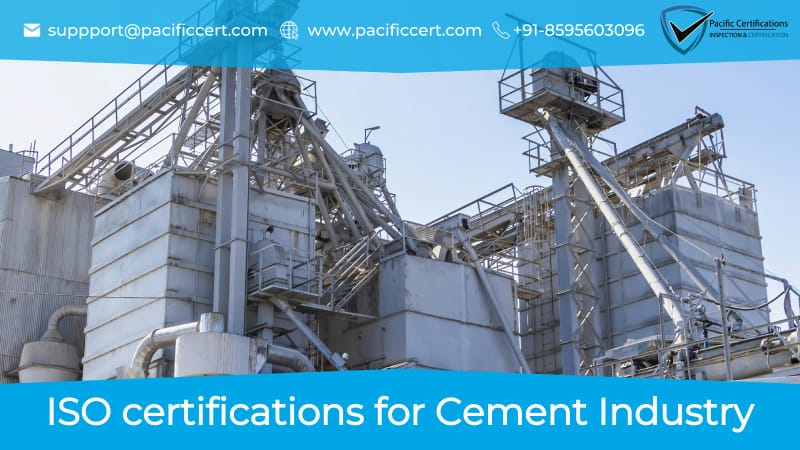ISO Certifications for Cement Industry, Requirements and Benefits

Introduction
The cement industry is a foundational sector for infrastructure, construction, and economic development, supplying essential materials for residential buildings, commercial projects, transportation networks, dams, power plants, and industrial facilities. Cement manufacturing involves large-scale, continuous operations such as raw material extraction, crushing, grinding, clinker production, kiln operations, packaging, storage, and distribution. These activities are capital-intensive, energy-heavy, and closely regulated due to their environmental, safety, and quality implications.
Cement producers operate under increasing pressure from regulators, governments, project owners, and global supply chains to demonstrate consistent product quality, safe operations, environmental responsibility, and controlled production processes. Issues such as inconsistent cement quality, kiln failures, dust emissions, high energy consumption, unsafe plant conditions, or weak documentation can result in regulatory penalties, production shutdowns, loss of contracts, and reputational damage. ISO certifications provide internationally recognized management system frameworks that help cement industry organizations standardize operations, manage risks, ensure compliance, and build long-term credibility in domestic and international markets.
In the cement industry, trust is built on consistent quality, operational safety, and controlled environmental performance.
Quick Summary
ISO certifications provide cement industry organizations with globally recognized frameworks to control product quality and process consistency through ISO 9001, manage occupational health and safety risks in plants, mines, and logistics operations through ISO 45001, control environmental impacts such as emissions, dust, and waste through ISO 14001, improve energy efficiency in kiln and grinding operations through ISO 50001, ensure continuity of large-scale production and supply through ISO 22301, protect operational, commercial, and technical information through ISO/IEC 27001, and establish structured risk management across operational, environmental, and regulatory risks through ISO 31000. Together, these standards support compliant cement production, stable supply, and long-term competitiveness in regulated construction markets.
For guidance on selecting the most relevant ISO standards for your cement operations, contact [email protected].
Applicable ISO Standards for Cement Industry
Here are some of the most applicable ISO standards for the cement industry:
ISO 9001:2015 - Quality Management Systems (QMS)
ISO 9001 forms the backbone of quality control in the cement industry by establishing structured management of raw material sourcing, mix design, clinker production, grinding, testing, packaging, storage, and dispatch. It supports consistent compliance with technical standards, customer specifications, and regulatory requirements through controlled processes, traceability, laboratory testing, calibration of equipment, and systematic handling of nonconforming products.
ISO 14001:2015 - Environmental Management Systems (EMS)
Cement manufacturing is closely regulated due to its environmental impact, including CO₂ emissions, particulate matter, quarrying effects, waste generation, and water usage. ISO 14001 helps cement producers identify and control environmental aspects, ensure compliance with environmental permits, manage emissions and waste responsibly, and improve environmental performance in line with regulatory and sustainability expectations.
ISO 45001:2018 - Occupational Health and Safety Management Systems (OHSMS)
Cement plants and quarries involve significant hazards, including heavy machinery, rotating equipment, high temperatures, dust exposure, noise, confined spaces, and bulk material handling. ISO 45001 provides a structured framework to identify hazards, assess risks, implement engineering and procedural controls, train workers, and reduce workplace accidents, injuries, and long-term health risks.
ISO 50001:2018 - Energy Management Systems (EnMS)
Kilns, mills, crushers, and material handling systems consume large amounts of thermal and electrical energy. ISO 50001 enables cement manufacturers to monitor energy consumption, identify inefficiencies, optimize fuel and power use, reduce operating costs, and lower carbon intensity. Energy management is a critical competitiveness and compliance factor in the cement sector.
ISO 22301:2019 – Business Continuity Management Systems
Cement production depends on continuous operations, stable energy supply, raw material availability, and logistics networks. Disruptions such as kiln breakdowns, fuel shortages, power failures, labor issues, or natural disasters can severely impact supply commitments. ISO 22301 ensures preparedness through business impact analysis, continuity planning, and recovery strategies to maintain or restore critical operations.
ISO 27001: Information Security Management Systems (ISMS)
Modern cement plants rely on digital systems for process control, maintenance planning, quality data, procurement, and commercial operations. ISO/IEC 27001 provides a structured approach to protecting operational data, laboratory results, contracts, and business information from cyber threats, data loss, and unauthorized access.
ISO 31000:2018 - Risk Management
ISO 31000 supports structured identification and management of risks related to operational failures, safety incidents, environmental non-compliance, supply-chain disruption, regulatory penalties, and reputational exposure. It helps cement industry leadership proactively manage uncertainty across production and business activities.
ISO 26000:2010 - Guidance on Social Responsibility
ISO 26000 provides guidelines for organizations to address their social responsibility. The cement industry's impact on local communities, labor practices, and ethical considerations make this standard relevant.
Click here to find out more applicable standards to your industry
What are the Requirements of ISO Certifications for Cement Industry?
Cement industry organizations seeking ISO certification must establish documented management systems and demonstrate consistent implementation across production, safety, environmental, energy, and governance functions. Below are the key requirements:
ISO 9001:2015 – Quality Management
Document production, testing, and dispatch processes
Define quality objectives aligned with standards and customer requirements
Control raw material traceability and laboratory testing records
Manage nonconforming products and corrective actions
Control process and formulation changes
Conduct internal audits and management reviews
ISO 45001:2018 – Occupational Health & Safety
Identify hazards related to plant, quarry, and logistics activities
Assess OH&S risks and implement engineering and procedural controls
Provide training, PPE, safe work procedures, and emergency preparedness
Monitor incidents, near-misses, and safety performance
ISO 14001:2015 – Environmental Management
Identify environmental aspects such as emissions, dust, waste, and water use
Control quarry impacts, kiln emissions, and waste streams
Ensure compliance with environmental permits and regulations
Monitor environmental objectives and improvement programs
ISO 50001:2018 – Energy Management
Identify energy-intensive processes and equipment
Monitor energy consumption and performance indicators
Implement efficiency improvements and optimization measures
Review and improve energy performance
ISO 22301:2019 – Business Continuity
Identify critical production and supply processes
Conduct business impact analysis (BIA)
Develop continuity and recovery plans
Test and review continuity arrangements
Tip:Map one complete cement production cycle—from raw material extraction and kiln operation to grinding, packaging, and dispatch—against ISO requirements to identify quality, safety, and compliance gaps early.
For assistance in evaluating your cement operations against ISO requirements, contact [email protected].
What are the Benefits of ISO Certifications for Cement Industry?
ISO certifications provide cement industry organizations with significant operational and commercial advantages, including:
Consistent cement quality and performance
Reduced production variability and rework
Safer plant and quarry operations
Stronger compliance with environmental and safety regulations
Improved energy efficiency and cost control
Better control over suppliers and logistics partners
Enhanced credibility with regulators, contractors, and project owners
Improved audit and inspection readiness
Eligibility for infrastructure, government, and export projects
Long-term operational resilience and sustainable growth
The global cement industry is undergoing a structural transition driven by urbanization, infrastructure renewal, and decarbonization mandates rather than pure capacity expansion. Gobal cement production stands at approximately 4.1 billion tonnes annually, with Asia accounting for nearly 70% of total output, led by China and India. Demand continues to be supported by large-scale housing programs, transportation corridors, renewable energy infrastructure, and industrial development, particularly in emerging economies.
At the same time, cement manufacturing is under increasing pressure to reduce its environmental footprint. The sector contributes nearly 7–8% of global CO₂ emissions, prompting regulators and governments to tighten emission norms, fuel standards, and energy efficiency requirements. In response, cement producers are investing heavily in alternative fuels, clinker substitution, blended cements, waste heat recovery systems, and high-efficiency kilns. Global investment in low-carbon cement technologies is estimated to exceed USD 150 billion by 2030, with a strong focus on measurable energy and environmental performance.
Digitalization is also reshaping cement operations. Advanced process control, real-time emissions monitoring, predictive maintenance, and AI-driven quality optimization are increasingly being deployed to improve consistency, reduce downtime, and control energy use. These developments are raising expectations for documented governance, traceability, and data integrity across cement plants and supply chains.
From a market access perspective, infrastructure developers, public authorities, and international lenders are placing greater emphasis on certified management systems as part of prequalification and compliance evaluation. By 2030, ISO-aligned governance is expected to be a standard operational requirement for professionally managed cement manufacturers supplying regulated and large-scale infrastructure projects.
How Pacific Certifications Can Help?
Pacific Certifications, accredited by ABIS, operates as an independent certification body for cement industry organizations by conducting impartial audits against applicable ISO standards. Our role is to objectively assess whether documented management systems and operational practices conform to international ISO requirements, based strictly on verifiable evidence and records.
We support cement industry organizations through:
Independent certification audits conducted in accordance with ISO/IEC 17021
Objective assessment of quality, safety, environmental, energy, and information security controls
Clear audit reporting reflecting conformity status and certification decisions
Internationally recognized ISO certification upon successful compliance
Surveillance and recertification audits to maintain certification validity
Contact Us
For ISO certification for cement industry organizations, contact [email protected]or call +91-8595603096.
Post by: Sony
Read more: Pacific Blogs

